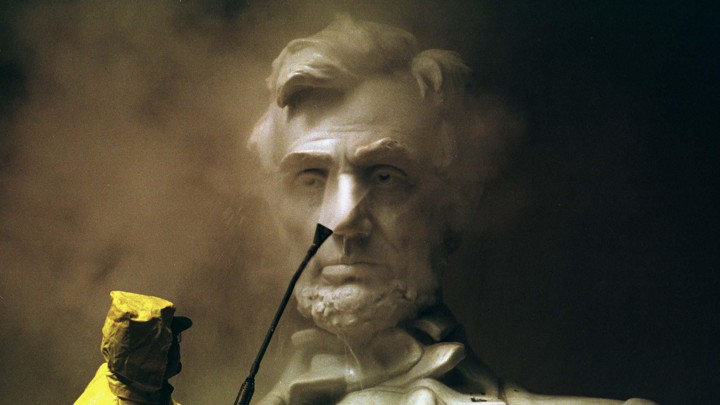Historians Should Stay Out of Politics
I signed a petition once, in a professional capacity, and regretted it straightaway. This was during the last election. Someone who knew that I despised Donald Trump as a public figure—I don’t know him as anything else—gave my name to another acquaintance, and presto: Suddenly I was being asked to lend my nonexistent prestige to the cause of Republican writers against Trump.
I can hear you now: Republican writers against Trump? What broom closet did you hold your convention in? Wise guy.
As it happened, there were more than a few of us—not much more, but more—and the thing appeared in due time on the web and, so I was told, in actual print somewhere too. As you read the self-consciously noble words you could see the nostrils flare of the men and women who’d written it, these Republican writers against Trump, so deep was their revulsion, so pure was their outrage, so desperate was their desire to separate themselves from the Republican dolts who were going to vote for their party’s nominee. To this clarion and passionate eloquence, the world, the entire English-speaking world, paid no attention whatsoever. Before long I felt ashamed and embarrassed, having thrust my name into political activism, attached to words I hadn’t written, and strutted across a stage I had no business being on, wagging my fanny in front of no one who cared.
Why was I so chagrined? A spasm of self-importance creates a terrible hangover. I have been alive many decades, and my memory is that no one, outside family members and close friends, has ever expressed the slightest interest in which presidential candidate got my vote, and I’m certain that no one had ever solicited that information from me in order to make his own decision on the subject. I should have taken this as a hint: No one cares whom I vote for.
Having taken a painful inventory of my own motives, I now know that people sign such ridiculous documents for a narrow set of reasons. As a scribbler of the third or fourth tier, far down the ranks in fame and income, I think I rather enjoyed seeing my name listed up there among writers who were genuinely accomplished and, not to put too fine a point on it, rich. I’d been invited to an A-list party! Worse, I wanted the world to know that I, too, despised Donald Trump as much as any other enlightened person. And I do—I despise Donald Trump. I want that to be clear. Have I mentioned this already? Cannot abide the man.
Anyway, it was an act equal parts self-aggrandizement and moral preening, and I’m not proud of it, and I wouldn’t mention it now except for a petition that crossed my line of sight the other day: “Historians’ Statement on the Impeachment of President Trump.” It appeared a few days before the House of Representatives went ahead and impeached Trump, and Nancy Pelosi even cited it in her own remarks on the House floor. Though impeachment is accomplished, the petition lives on, still collecting signatures. By now it has the endorsement of more than 1,500 people who identify themselves as historians, most of them professors of one rank or another, at universities of various reputation.
The thesis of the petition goes like this: “President Trump’s numerous and flagrant abuses of power are precisely what the Framers had in mind as grounds for impeaching and removing a president.”
When I first read the statement, I took that superfluous adverb, precisely, as a bad sign. No one knows precisely what the Framers had in mind when it comes to impeachable offenses, and if we did, we could be sure it didn’t involve transcontinental telephone calls, gaga theories about computer servers, Javelin anti-tank missiles, or the sovereign nation of Ukraine, none of which existed when the Framers were framing away. Trump’s abuses and the kinds of violations the Framers thought were impeachable may bear a general similarity, or fall into the same general category, but that’s a different matter. Precision, we see early on, is precisely what the historians are not after.
The sloppiness is important because the whole statement is supposed to be self-validating. It is a reflexive form of what logic-choppers call an argumentum ab auctoritate, or argument from authority. The idea is to prove a disputed claim by pointing out that some expert or other authority believes the claim to be true. It’s a bogus but very popular trick. Trump loves it, and uses it more adamantly the more outlandish his assertions get. The authority he cites most often is “everybody.” “Many, many dogs can be taught to play poker,” he will yell to reporters on the White House lawn, his hand slicing the air as a waiting helicopter whirrs away. “Everybody knows it.” The historians are not much more reassuring. Their authority for their statement is them.
And this should be enough for the rest of us, goes the implication. The instigator of the petition is a Princeton historian named Sean Wilentz, who speaks with a self-asserted authority that’s best described as papal. Impeachments move him to declaim ex cathedra, like Pius IX pondering the Immaculate Conception. In 1998, he got up another petition of historians—roughly 400 of them; this was before Ph.D. inflation really took off—who told members of the House not to impeach President Bill Clinton. Wilentz even appeared before a House committee and announced that if a majority voted for impeachment, “history will track you down and condemn you for your cravenness.” (Bet he’s a tough grader.)
Well, that was then. The present statement, Wilentz told The New York Times the other day, is “a kind of petition to the public.” Historians, he said, “have a civic role, as keepers in some ways of the nation’s heritage, as people who have devoted our lives to studying this country.” The Times helpfully cited three of the heritage keepers who were among the early signers of the petition: Ron Chernow (author of Washington: A Life), Ken Burns (The Civil War, etc., etc.), and Robert Caro (The Years of Lyndon Johnson, four volumes and counting).
You’ll notice that none of these three holds a full-time university position as a professor of history. They are incidental historians—Burns is a filmmaker who prefers historical topics; Chernow and Caro are journalists and writers who have fallen into the vocation of writing popular biography. But they are famous and rich, and I of all people should understand the bandwagon effect such company generates. Scrolling through the endless list of obscure signatories from backwater colleges scattered between the coasts, I could just imagine them running home that evening to humblebrag to their wives or husbands, girlfriends or boyfriends: “Yeah, me and Bob Caro, we just figure enough is enough—impeach the bastard!”
The lasting question the petition raises is: “So what?” Put another way: “Should we care what these historians think about Trump’s impeachment?” In important ways the petition is as predictable as Halley’s Comet. Historians, no less than other academics, are deeply resentful of the public’s lack of interest in what they do, and understandably lunge at a turn in the popular spotlight. And the profession itself, like all the humanities, is ideologically monochromatic. Surveys show that the percentage of academic historians who say they’re Republicans ranges between 4 and 8 percent. If we set aside Hillsdale College, Bob Jones University, Thomas Aquinas College, and a couple of others, the more accurate percentage is probably half that. We can’t know how many within the other 98 percent consider themselves Democrats first and historians second. We can guess that many of them ache to think of themselves as “keepers of the nation’s heritage.” Not necessarily an authoritative bunch.
Historians claim expertise about the past; Trump’s impeachment is of the present. The study of history is crucial to a well-rounded intellect, it’s true, but neither a cultivated intellect nor a knowledge of history is a replacement for good judgment, which is what politics calls for. The whole democratic enchilada rests on the assumption that when it comes to prudential matters of public importance, the view of the stevedore is as valuable as that of the Princeton professor.
It’s not the first time we’ve seen this category mistake used to advance a partisan purpose. In the 1980s, leftish nuclear physicists enjoyed great praise and attention for their petitions in favor of unilateral disarmament—as if knowing how to build a bomb was the same as knowing whether it should be used. A decade ago, many medical doctors signed petitions telling the rest of us that harvesting human stem cells for research was just fine—trying to shut down an argument over morality and metaphysics far beyond the scope of their medical training.
If I want to understand the Whiskey Rebellion of the 1790s, Sean Wilentz will be my go-to guy, I promise. But Trump’s impeachment, and contemporary politics in general? Nah. My TV went on the blink last week, but I didn’t call Amy Poehler to fix it just because she knows how to act.
We want to hear what you think about this article. Submit a letter to the editor or write to letters@theatlantic.com.
ANDREW FERGUSON is a staff writer at The Atlantic. He is the author of Fools’ Names, Fools’ Faces; Land of Lincoln; and Crazy U: One Dad’s Crash Course on Getting His Kid Into College.


No comments:
Post a Comment